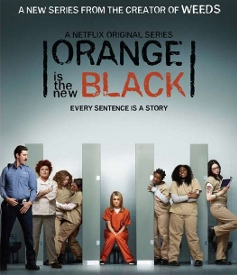
Orange is Our New Obsession
 Summer 2013: the season that those of us blessed with Netflix accounts compulsively binge-watched the women’s prison dramedy, “Orange is the New Black.” The series follows a WASPy Smithie named Piper Chapman (the fictional avatar of memoirist Piper Kerman) during her year in the Fed for a youthful indiscretion: acting as a drug mule for her ex-girlfriend. In each episode, viewers not only encounter the sexually flexible love triangles, beefs, and tribulations of the inmates, but also heartbreaking flashbacks that show how they ended up behind bars.
Summer 2013: the season that those of us blessed with Netflix accounts compulsively binge-watched the women’s prison dramedy, “Orange is the New Black.” The series follows a WASPy Smithie named Piper Chapman (the fictional avatar of memoirist Piper Kerman) during her year in the Fed for a youthful indiscretion: acting as a drug mule for her ex-girlfriend. In each episode, viewers not only encounter the sexually flexible love triangles, beefs, and tribulations of the inmates, but also heartbreaking flashbacks that show how they ended up behind bars.
My experience as a viewer was typically intense. I suffered acute insomnia from hours of overstimulation as my husband and I raced towards the final episode. I lay in bed pondering the characters’ fates (“They’re not real!” I reminded myself). I openly sobbed on my couch as the plotlines deepened, exploding the broader caricatures we had initially seen. One supposedly brash inmate, Taystee, returns to prison after struggling on the outside; another stoic inmate, Ms. Claudette, who had finally learned to hope for release, loses that hope. And the kicker: the unstable but observant Suzanne, who’s called “Crazy Eyes” by the other inmates, poignantly asks Piper to explain why they call her that–indicting the audience for laughing at her in earlier episodes.
After I finished watching the show, my obsessing continued. I followed the debate about the show’s accuracy, its race and gender politics, including its groundbreaking transgender character, Sophia, played by Laverne Cox, a transgender actress. Is it okay to use a morally ambiguous white protagonist as a “Trojan Horse” to illuminate the lives of women of color–as the show’s creator Jenji Kohan asserted she did on NPR’s Fresh Air? (Kohan, who’s Jewish, also noted in the interview, with some glee, that Piper Chapman is a “WASPy, cold shiksa.)
And as Roxane Gay asks, is the show’s glowing reception really earned, or are we so starved for decent content about diverse women, that any such show with reasonable smarts seems more revelatory than it actually is (I call this the “Juno Effect”)?



